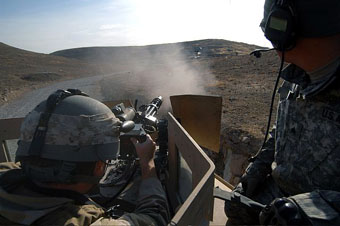
CENTCOM Reveals Battle Plan for Mosul
| published February 20, 2015 |
By Thursday Review staff
When CBS News and other media outlets reported on Thursday that a highly-placed official with the U.S. Central Command had revealed the existence of an imminent plan—apparently in the final stages of development—for Iraqi and Kurdish forces, backed by U.S. special forces and advisors, to retake the key Iraqi city of Mosul, there was a general feeling that, at last, the anti-ISIS forces were getting proactive in the fight against the Islamic State.
The only problem is that by revealing the broad strokes of that battle plan, set to take place in April and May, U.S. commanders in Tampa, Florida have exposed the operation to the world, and basically given ISIS militants an opportunity to prepare in advance for what may now become a protracted, costly siege.
Military analysts say that any element of surprise is now effectively gone, and Iraqi and American planners can now expect for ISIS forces to dig in, bolstering the city’s perimeter defenses and stockpiling supplies and weapons.
Word of the planned offensive started as early as late Wednesday, but gained full traction in the media by midday Thursday.
According to the leaked information, U.S., Iraqi and coalition planners—which would presumably include the air power commanders of Jordan, Egypt, Saudi Arabia and Qatar, along with the United Kingdom—are in the final stages of developing a plan for a major ground assault on the area around Mosul. The campaign would require at least 20,000 Iraqi troops, along with mixed units from Kurdish and other ethnic militant forces. Embedded among the Iraqi forces would be American troops and advisors, who would—in theory at least—not serve in front line positions, but would serve as liaisons to the U.S. Central Command and the Pentagon. The initial attack would begin in April, and is estimated to require most of May to complete, with a target date of mid-June for completion of the offensive phases of the operation. Specifically, according to the sources at the U.S. Central Command, the goal would be to complete all major operations before Ramadan, which begins of June 17.
According to Fox News, the entire operation will require five Iraqi army brigades and three brigades of Kurdish Peshmerga fighters, all backed by the combined air power of at least five countries. CENTCOM would be responsible for real-time analysis as the battle proceeds, including the direction of air support, drone and satellite surveillance, and the dissemination of all on-the-ground intelligence.
But among the major concerns expressed by both current and retired military analysts is the worrisome element of broadcasting such battle plans in advance. In addition to stockpiling weapons, ammunitions and supplies, ISIS fighters may have ample opportunity to lay wide fields of land mines, anti-tank devices, and improvised explosives across any potential entry point to Mosul. ISIS would also very likely begin immediately constructing defenses around the city, including fortified gun emplacements and bunkers. Currently, ISIS controls the city of Mosul with about 2,000 of its heavily armed militants.
The overall plan to retake Mosul, which neither the Pentagon nor the Central Command have officially denied, is nevertheless being questioned by seasoned military analysts and former military commanders who have wondered aloud if such a plan even existed at all, especially in the context of the widely disseminated media disclosures. If such a comprehensive plan did exist, why reveal it to the press so early? This has led some intelligence analysts to call for a closer investigation of the leaks and the sources of the information.
A small contingent of U.S. forces are already training in Syria (exact numbers have not been confirmed), and Qatar has been hosting on-the-ground training for large scale troop operations for more than a month. In addition to Iraqi and U.S. personnel, the preparations under way in Qatar include the training of moderate Syrian rebels—ostensibly anti-Assad, but also anti-ISIS. Some military analysts worry that by broadcasting the Mosul operations early, it will allow time for infiltration by radical elements—a development which could, in the worst case threaten the lives of coalition soldiers, and at the least allow for information about coalition operations to reach ISIS in advance of each step in the battle.
Related Thursday Review articles:
Italy Feels Pressure From ISIS; Thursday Review staff; Thursday Review; February 18, 2015.
Egypt Strikes ISIS Targets in Libya; Thursday Review staff; Thursday Review; February 16, 2015.
